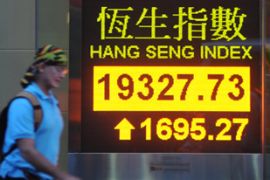Markets leap after US move on debts
Ban on short-selling of stocks sends banking shares rocketing in Europe.

In Sydney, Australian investment bank Macquarie Group saw its stock surge by as much as 51 per cent, its biggest one-day gain on record.
Concerted effort
The upswing also followed a co-ordinated drive by central banks around the world to release $180bn to alleviate any credit crunch.
The move by the Bank of Canada, the Bank of England, the European Central Bank, the US Federal Reserve, the Bank of Japan and the Swiss National Bank is the fourth such concerted effort since the start of the credit crisis last year.
In Shanghai, China’s main stock index surged 9.5 per cent – it’s biggest one-day percentage gain ever.
Chinese investors got an additional boost from a government decision to eliminate a tax on share purchases and government plans to use an investment fund to buy shares in three major banks.
“I knew it would rise, but didn’t expect it to jump so high,” Zhao Yueming, a dealer at Cinda Securities, told the Associated Press.
“China’s stock market is always crazy beyond people’s expectations.”
The bounce in Asia comes after a 410-point overnight gain on Wall Street following a late surge in the trading day on news that the US government might set up a central facility to take on banks’ bad debts.
It was the Dow’s biggest percentage point gain since October 2002 but still left the index down about 400 points for the week after routs on Monday and Wednesday.
Intervention plan
Henry Paulson, the US treasury secretary, said the government was crafting a plan to rescue banks from bad debts that were at the heart of Wall Street’s worst financial crisis in decades, but that it would need congressional approval.
|
“We’ve talked about a comprehensive approach that will require legislation to deal with illiquid assets on financial institutions of the United States on their balance sheet” Henry Paulson, |
He and Ben Bernanke, the US Federal Reserve chairman, briefed legislators on the options they were considering on Thursday and asked them to pass legislation giving the government power to buy distressed assets.
“What we are working on now is an approach to deal with the systemic risk and the stresses in our capital markets and we’ve talked about a comprehensive approach that will require legislation to deal with illiquid assets on financial institutions of the United States on their balance sheet,” Paulson told reporters in Washington.
Paulson is reportedly considering setting up a new form of the Resolution Trust Corporation, a body set up by the US government in 1989 to help liquidate bad company debts, particularly in areas related to the property market, but closed down in 1995.
Al Jazeera’s John Terret, reporting from New York, said Wall Street investors were buoyed by the news but added that if the prospective rescue did not materialise, markets were likely to see another round of sharp falls.
Action urged
William Browder, CEO of the investment group Hermitage Capital Management, told Al Jazeera that the current financial crisis demanded immediate action.
“It is a problem of global proportions and it is not just happening in one country. I suspect that this is not going to be the last big action that the regulators take,” he said.
“In a moment like this, where everyone is competing with each other to sell everything, it is very hard to say that money is safe even under the mattress.
“If the governments are investing millions into the markets, where is that money coming from? They probably printed it. Even the money under the mattress will be inflated away.”